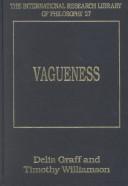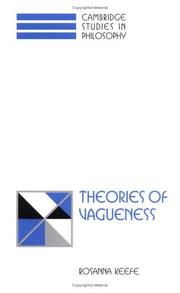| Listing 1 - 10 of 48 | << page >> |
Sort by
|
Book
ISBN: 9789400703742 9400703740 9786613086082 9400703759 1283086085 Year: 2011 Publisher: Berlin Springer
Abstract | Keywords | Export | Availability | Bookmark
 Loading...
Loading...Choose an application
- Reference Manager
- EndNote
- RefWorks (Direct export to RefWorks)

ISBN: 0754620808 Year: 2002 Publisher: Aldershot Ashgate
Abstract | Keywords | Export | Availability | Bookmark
 Loading...
Loading...Choose an application
- Reference Manager
- EndNote
- RefWorks (Direct export to RefWorks)

ISBN: 0521650674 9780521650670 Year: 2000 Publisher: Cambridge Cambridge University press
Abstract | Keywords | Export | Availability | Bookmark
 Loading...
Loading...Choose an application
- Reference Manager
- EndNote
- RefWorks (Direct export to RefWorks)
Most expressions in natural language are vague. But what is the best semantic treatment of terms like 'heap', 'red' and 'child'? And what is the logic of arguments involving this kind of vague expression? These questions are receiving increasing philosophical attention, and in this timely book Rosanna Keefe explores the questions of what we should want from an account of vagueness and how we should assess rival theories. Her discussion ranges widely and comprehensively over the main theories of vagueness and their supporting arguments, and she offers a powerful and original defence of a form of supervaluationism, a theory that requires almost no deviation from standard logic yet can accommodate the lack of sharp boundaries to vague predicates and deal with the paradoxes of vagueness in a methodologically satisfying way. Her study will be of particular interest to readers in philosophy of language and of mind, philosophical logic, epistemology and metaphysics.
Vagueness (Philosophy). --- Vagueness (Philosophy) --- Philosophy
Book
ISBN: 0191085707 0191826103 9780191826108 0191085715 Year: 2017 Publisher: Oxford : Oxford University Press,
Abstract | Keywords | Export | Availability | Bookmark
 Loading...
Loading...Choose an application
- Reference Manager
- EndNote
- RefWorks (Direct export to RefWorks)
Bringing together leading scholars working on the topic of vagueness in philosophy and in law, this book fosters a dialogue between philosophers and legal scholars by examining how philosophers conceive vagueness in law from their theoretical perspective and how legal theorists make use of philosophical theories of vagueness.

ISBN: 0511052154 0511151454 051101032X 9780511010323 0511036922 9780511036927 9780521650670 0521650674 Year: 2000 Publisher: Cambridge New York Cambridge University Press
Abstract | Keywords | Export | Availability | Bookmark
 Loading...
Loading...Choose an application
- Reference Manager
- EndNote
- RefWorks (Direct export to RefWorks)
Most expressions in natural language are vague. But what is the best semantic treatment of terms like 'heap', 'red' and 'child'? And what is the logic of arguments involving this kind of vague expression? These questions are receiving increasing philosophical attention, and in this timely book Rosanna Keefe explores the questions of what we should want from an account of vagueness and how we should assess rival theories. Her discussion ranges widely and comprehensively over the main theories of vagueness and their supporting arguments, and she offers a powerful and original defence of a form
Book
ISBN: 3030667812 3030667804 Year: 2021 Publisher: Cham, Switzerland : Springer,
Abstract | Keywords | Export | Availability | Bookmark
 Loading...
Loading...Choose an application
- Reference Manager
- EndNote
- RefWorks (Direct export to RefWorks)
Book
ISBN: 9780198722373 0198722370 Year: 2017 Publisher: Oxford: Oxford university press,
Abstract | Keywords | Export | Availability | Bookmark
 Loading...
Loading...Choose an application
- Reference Manager
- EndNote
- RefWorks (Direct export to RefWorks)
In psychiatry there is no sharp boundary between the normal and the pathological. Although clear cases abound, it is often indeterminate whether a particular condition does or does not qualify as a mental disorder. For example, definitions of subthreshold disorders and of the prodromal stages of diseases are notoriously contentious. Philosophers and linguists call concepts that lack sharp boundaries, and thus admit of borderline cases, 'vague'. Although blurred boundaries between the normal and the pathological are a recurrent theme in many publications concerned with the classification of mental disorders, systematic approaches that take into account philosophical reflections on vagueness are rare. This book provides interdisciplinary discussions about vagueness in psychiatry by bringing together scholars from psychiatry, psychology, philosophy, history, and law. It draws together various lines of inquiry into the nature of gradations between mental health and disease and discusses the individual and societal consequences of dealing with blurred boundaries in medical practice, forensic psychiatry, and beyond.
Book
ISBN: 3969751454 Year: 2020 Publisher: Boston : BRILL,
Abstract | Keywords | Export | Availability | Bookmark
 Loading...
Loading...Choose an application
- Reference Manager
- EndNote
- RefWorks (Direct export to RefWorks)
This book, developed from a dissertation at the University of Heidelberg, explores the philosophical concept of vagueness and its implications. It examines different positions on the nature of vagueness, aiming to understand the connections between various theses and claims. The text delves into the Sorites Paradox, a logical problem related to vague predicates such as 'bald', 'heap', and 'rich'. The author discusses different logical and philosophical approaches to tackling this paradox, including three-valued logic and fuzzy logic. The book is intended for scholars and students interested in philosophy, particularly those engaged with epistemology and logic.

ISBN: 0877229465 Year: 1992 Publisher: Philadelphia (Pa.): Temple university press
Abstract | Keywords | Export | Availability | Bookmark
 Loading...
Loading...Choose an application
- Reference Manager
- EndNote
- RefWorks (Direct export to RefWorks)
Book
ISBN: 9780199570386 Year: 2010 Publisher: Oxford Oxford University Press
Abstract | Keywords | Export | Availability | Bookmark
 Loading...
Loading...Choose an application
- Reference Manager
- EndNote
- RefWorks (Direct export to RefWorks)
Vagueness (Philosophy) --- Vagueness (Philosophy). --- Philosophy of language --- Philosophy
| Listing 1 - 10 of 48 | << page >> |
Sort by
|

 Search
Search Feedback
Feedback About UniCat
About UniCat  Help
Help News
News